
The Desiderata Poem by Max Ehrmann. Careful Church version. Painting by Desiderata Gallery
In "Desiderata," Ehrmann states that although the world is full of "sham, drudgery, and broken dreams, it is still a beautiful world." This idea of accepting the world's problems but still retaining an optimistic view is a motif in Ehrmann's poetry. For example, in "Whatever Else You Do," he writes that "however much you condemn the evil in the.
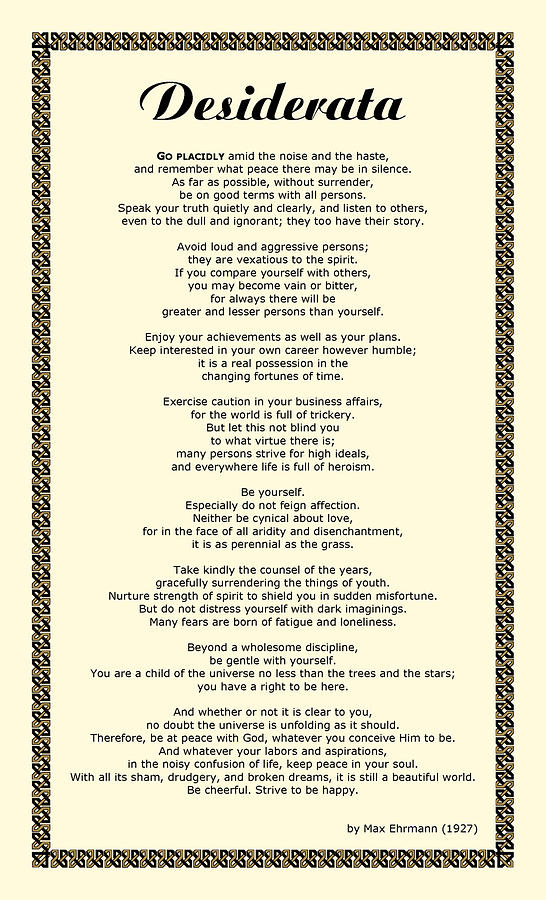
Sepia Chain Desiderata Poem by Claudette Armstrong Sepia Chain Desiderata Poem Mixed Media
" Desiderata " (Latin: "things desired") is a 1927 prose poem by the American writer Max Ehrmann. The text was widely distributed in poster form in the 1960s and 1970s. History Max Ehrmann of Terre Haute, Indiana started writing the work in 1921, but he did not assign it a title.

Desiderata, Printable Art, PRINTABLE QUOTE, A4 Print, Inspirational Print, Instant Download Art
- All Poetry Anton Jarvis · Desiderata by Max Ehrmann Desiderata are, technically, things considered necessary or highly desirable OR something lacked and wanted. The poem is a list of things desirable in life. Desiderata - Words for Life Go placidly amid the noise and haste, and remember what peace there may be in silence.
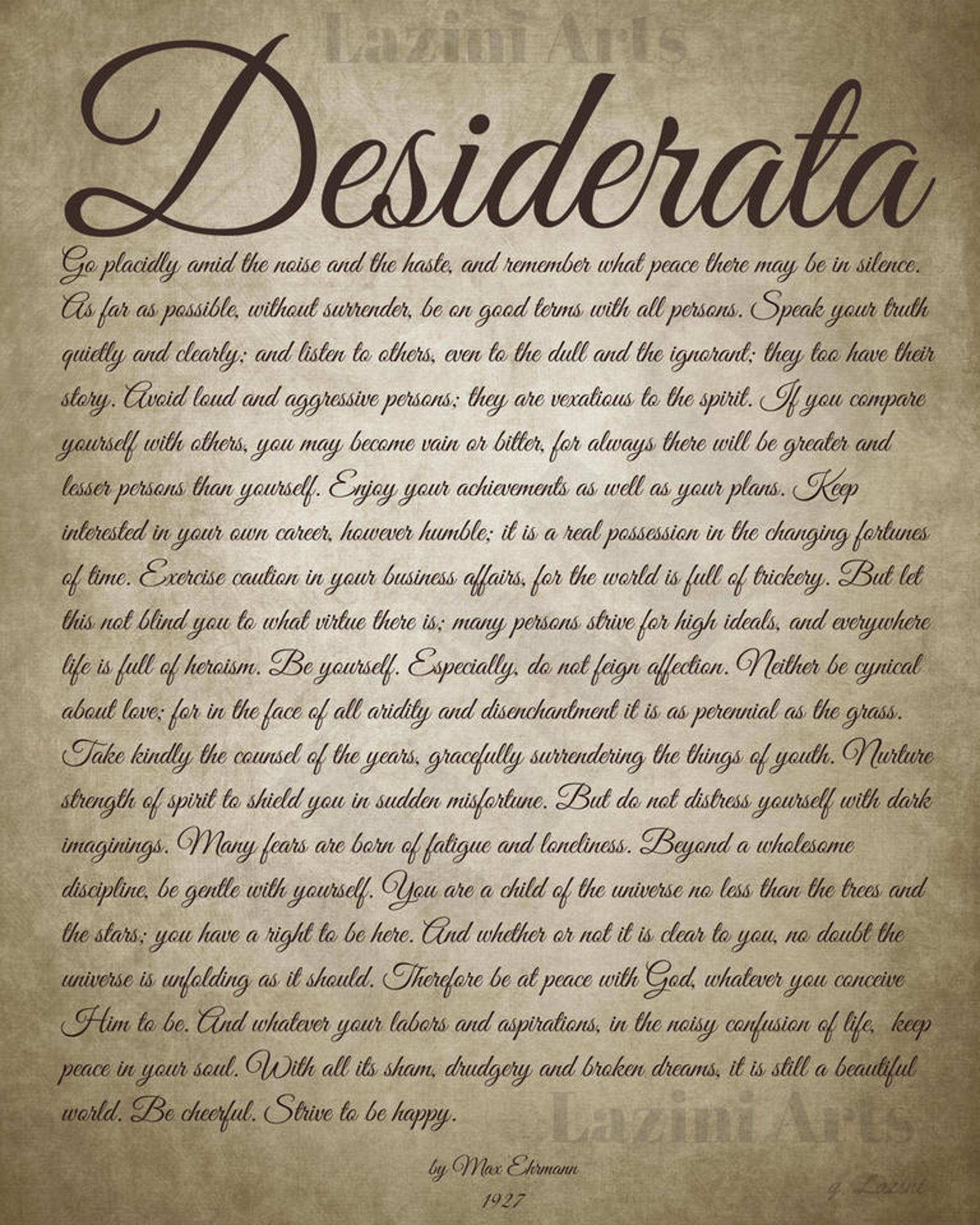
Desiderata Poem Desiderata Print Desiderata Poster Poetry Wall Etsy Australia
Desiderata - Desiderata Poem - Desiderata Prints Desiderata Desiderata, which means "things that are desired," was written by Max Ehrmann, "because it counsels those virtues I felt most in need of." Since the early 1920s these words have been valued by countless people and rose in popularity in the late '60s and early '70s.

Buy The Desiderata Poem by Max Ehrmann. 11 X 17 Poster on Archival Parchment Paper. by
Desiderata Poem: A Way of Life by Max Ehrmann - Planet of Success Life can be quite a struggle at times. We sometimes feel lost and don't know how to deal with the difficulties we're confronted with. Even more importantly, it feels as if we're facing the struggle all alone.

Desiderata Max ehrmann, Desiderata, Desiderata poem
Speak your truth quietly and clearly; and listen to others, even to the dull and the ignorant; they too have their story. Avoid loud and aggressive persons; they are vexatious to the spirit. If you compare yourself with others, you may become vain or bitter, for always there will be greater and lesser persons than yourself.

Desiderata Poem by Max Ehrmann Original Blackboard Design Painting by Desiderata Gallery
The advice in the calming poem Desiderata, written in 1927, is an excellent focus for the practice of mindful meditation. A paraphrase in this article of Max Ehrmann's didactic words, which were written for his daughter, is followed by an analysis of the poetic techniques within the lines.. At first glance, the text may appear to more.
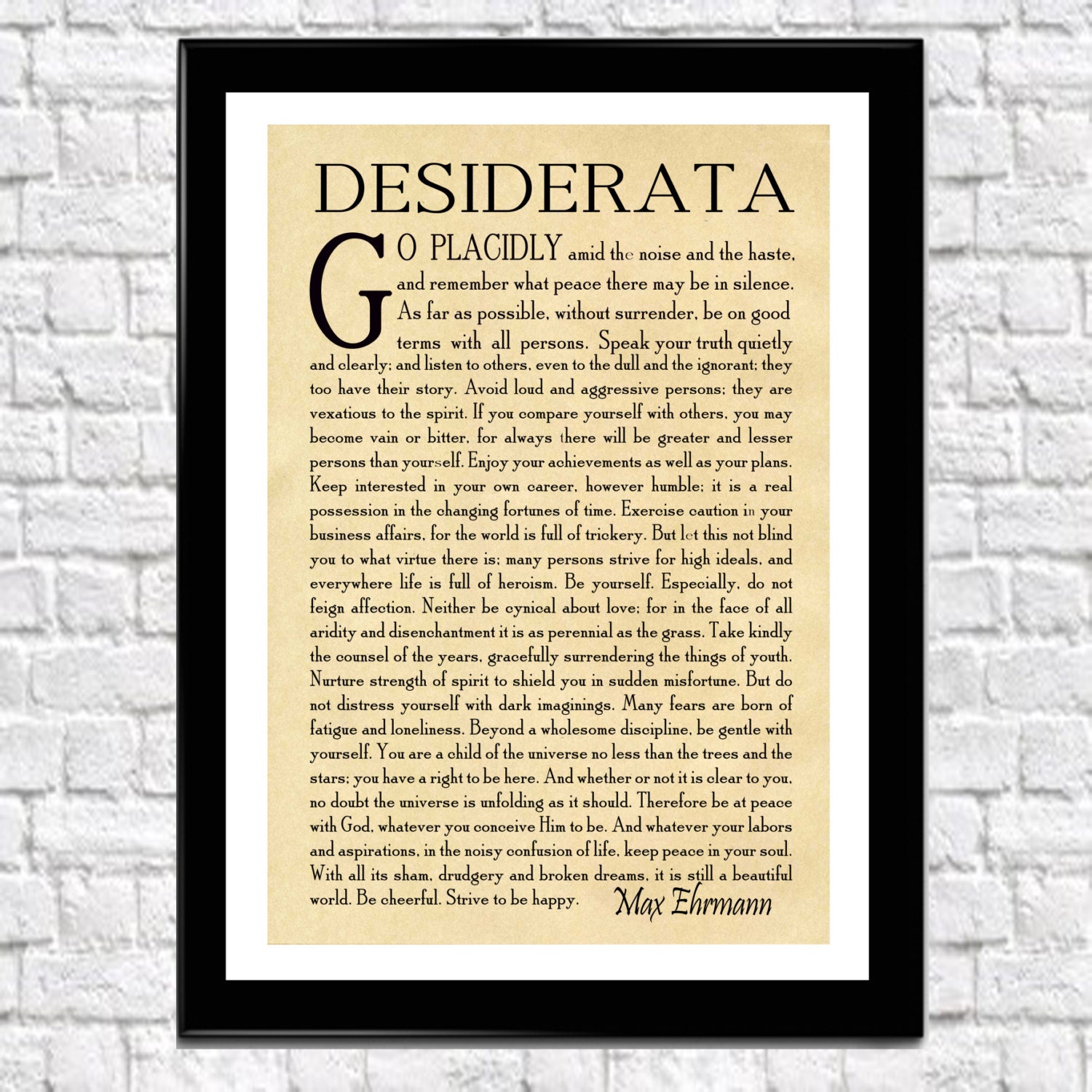
Desiderata Poem Desiderata Print Desiderata Poster Poetry Wall Art Graduation Gift Graduation
Stanza 1 Go placidly amid the noise and haste, and remember what peace there may be in silence. The opening promises a realm of tranquility ahead. The world is loud and fast. It's easy to be overwhelmed by the sensory overload. Keep your calm or ' Go placidly ' is what the poet advises.

desiderata Desiderata poem, Desiderata, Spiritual poems
Strive to be happy. Summary and Analysis Editors Rating 4.9 Meaning of the Poem Desiderata is a prose poem written by American poet Max Ehrmann. Largely unknown in the author's lifetime, the text became widely popular after its use in devotional and spoken-word recordings in 1971 and 1972. # Max Ehrmann Previous: A Psalm of Life

Desiderata Poem by Max Ehrmann Lotus Watercolor Design Painting by Desiderata Gallery Pixels Merch
DESIDERATA - The poem "Desiderata" was written by Max Ehrmann and here is the original and complete text of this classic. This classic was written around 1920 and was copyrighted in 1927 by lawyer Max Ehrmann who was based in Terre Haute, Indiana. He was born on September 16, 1872, and his parents were German immigrants.
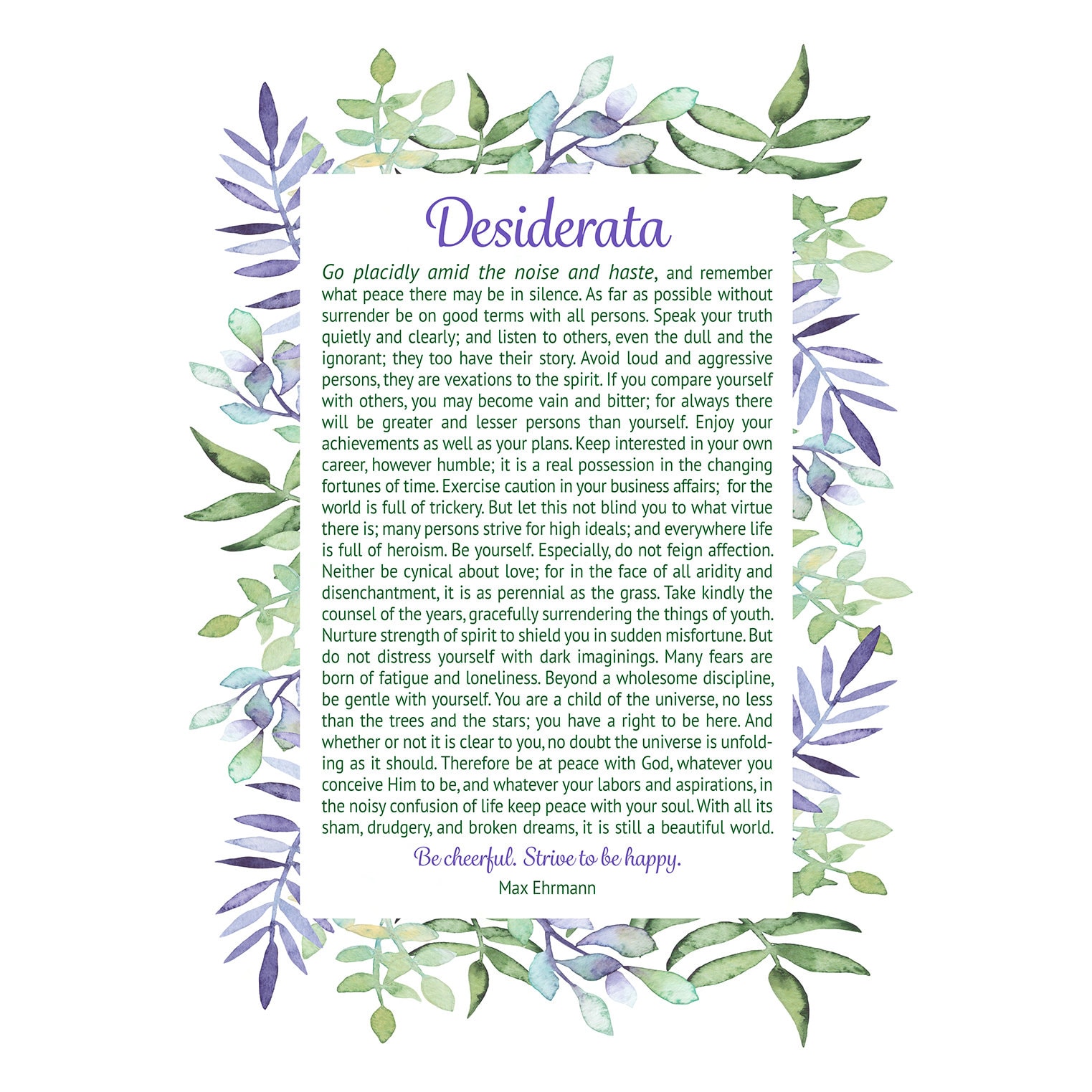
Desiderata Printable Desiderata Print Desiderata Poster Etsy UK
While its exact origin is questionable, it's widely believed that Max Ehrmann, a poet, and lawyer wrote it after being inspired by a diary entry he made about desire (Desiderata means "desire" in Latin). When you're next going through a period of self-doubt or you having problems accepting someone or a situation, read the Desiderata poem.

Desiderata Poem on Watercolor Painting by Desiderata Gallery Pixels Merch
' Desiderata', a word which means "things desired" in Latin, is a widely popular prose poem that was written in the early 1920s. Ehrmann copyrighted the work in 1927 but a few years later gave out copies without copyright, therefore, forfeiting his US copyright. This is lead to the prose poem's wide circulation and benefited its popularity.

Desiderata. Desiderata Poster. Desiderata Poem. Full Text. Etsy
Be yourself. Especially do not feign affection. Neither be cynical about love; for in the face of all aridity and disenchantment it is as perennial as the grass. Take kindly the counsel of the years, gracefully surrendering the things of youth. Nurture strength of spirit to shield you in sudden misfortune.

The Desiderata Poem A Beautiful Lesson for Life
In Search of "Desiderata". The tangled story behind a most popular poem. You remember "Desiderata.". Maybe you heard its sweet strains on the radio. Or you recall key phrases—"you are a child of the universe" or "be gentle with yourself.". Chances are you have an aunt who hung a plaque of the poem set in calligraphy, its first.
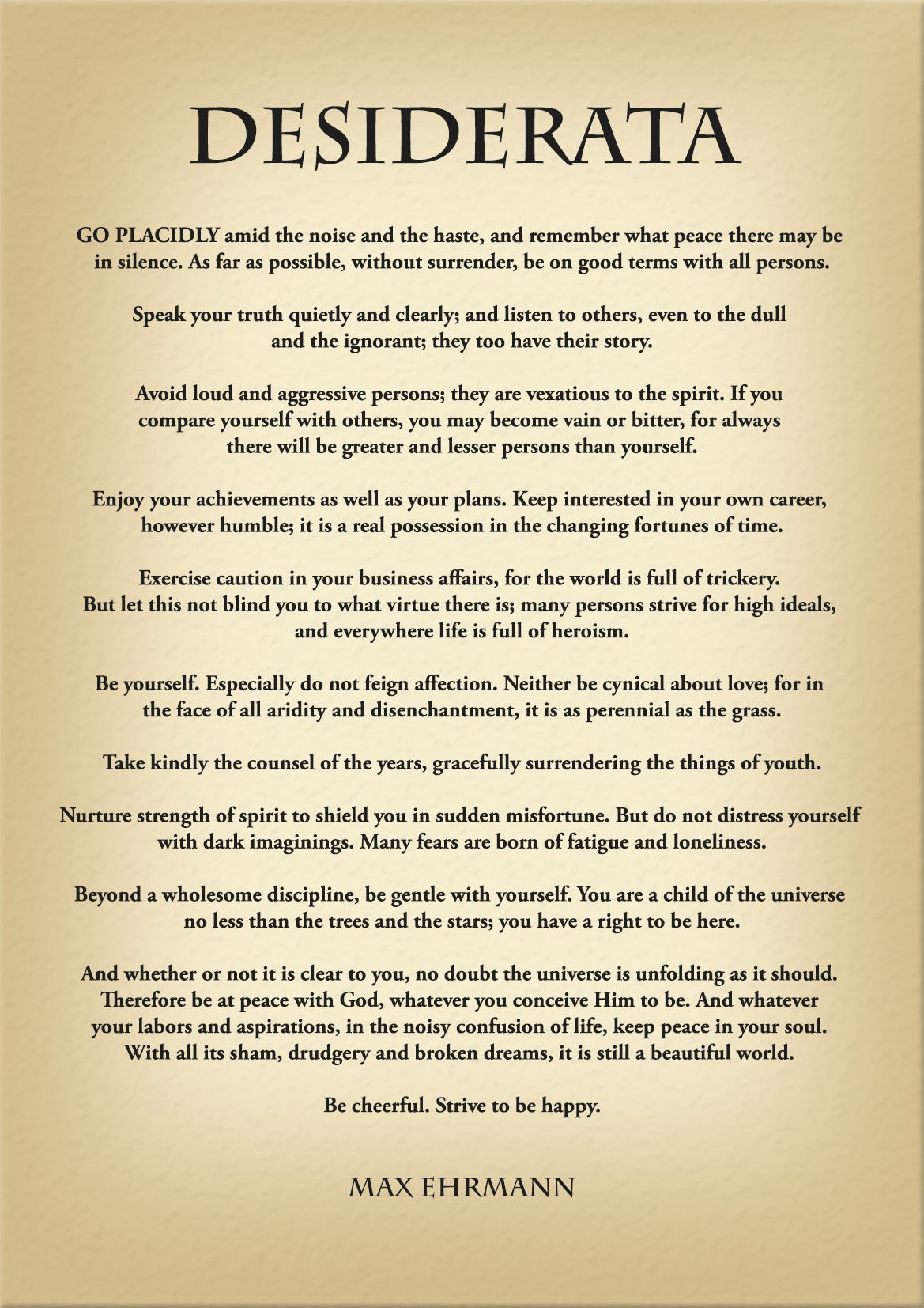
Poetry Print Desiderata Poem Art Illustration Etsy Australia
Desiderata (Latin: "desired things", plural of desideratum, the supine of desidero) is a 1927 prose poem by American writer Max Ehrmann (1872-1945).

Poster Only Cheerful Desiderata Poem 11 X 17 by DesiderataGallery
Desiderata was written in 1927 by Max Ehrmann, a poet and lawyer from Terre Haute, Indiana. The word desiderata means "things that are desired." Ehrmann said he wrote it for himself, "because it counsels those virtues I felt most in need of."